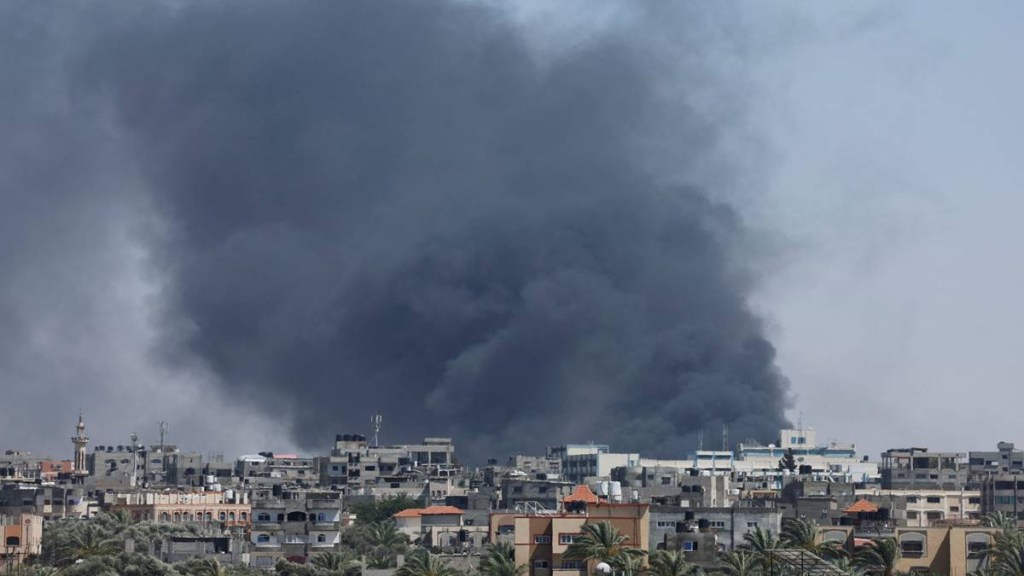By -Jagdish N Singh
Iran today is too engrossed in consolidating the legacy of its supreme leader Ali Khamenei to waging war against Israel and the United States. Tehran’s focus is on installing a like-minded successor to Khamenei and ensuring the survival of the Islamist regime in the country.
Admit it or not, the ongoing Israel-Hamas war in Gaza has been expanding beyond its present theatre. Reports are that since the Israeli retaliation against the Hamas-perpetrated October 7 carnage, the Iran-backed militias in Syria and Iraq have attacked American forces over a hundred times.
On their part, Washington and allies have been fully behind Jerusalem. At the start of the Israel-Hamas war, in order to help Israel, the Biden administration sent the USS Gerald R. Ford aircraft carrier to the Eastern Mediterranean and the USS Dwight D. Eisenhower to the Gulf of Aden. In early November 2023, Washington sent a nuclear-powered submarine, the USS Florida, and the USS Bataan, an amphibious assault ship, to the Gulf. In support of Israel, Britain and other NATO countries sent planes, helicopters and special forces to be on standby in Cyprus.
Notwithstanding the apparent differences between American President Joe Biden and Israeli Prime Minister Benjamin Netanyahu over the latter’s course of action against Hamas in Gaza, the United States has stood by Israel in substantial ways. The other day, US President Biden called the ICC’s May 19 action “outrageous,” stating, “There is no equivalence – none – between Israel and Hamas. We stand with Israel against threats to its security.”
However, knowledgeable sources say, Iran is highly unlikely to wage a war on Israel and its allies, the United States in particular. Notwithstanding its rhetoric against the United States and Israel, which it brands as the “Great Satan” and the “Little Satan” respectively, the regime in Tehran is very down to earth. It knows that it cannot militarily take on the United States and Israel. It is aware that Washington and Jerusalem are on very strong terms. The US-Israeli strategic alliance has continued to grow over the years. Last month, the US Senate approved a military aid package worth US$95 billion for Israel (Ukraine and Taiwan).
Also, Tehran is aware that it had to end its missile attacks on Israel in April this year. Virtually, none of them could reach their targets. According to an authentic report, Israel intercepted most of the Iranian drones and missiles; the US and Jordan also shot some down. Iran had made those attacks in retaliation for an apparent Israeli strike on an Iranian embassy some time back. Iran’s attacks caused just some minor damage at one Israeli military base.
The sources say Tehran is likely to remain content with its current strategy of proxy warfare. As part of its strategy, it may secretly encourage Hezbollah to hurt Israeli assets abroad. Pertinently, in his latest response to the killing of co-founder of Hamas’s military wing and deputy head of its political bureau Saleh al Arouri in southern Beirut, Hezbollah leader Hasan Nasrallah has warned, “We’ll choose the right place and the right time… the field will respond.” Hezbollah has long vowed to retaliate for the killing in Lebanon of any representative of the Iranian-backed Axis of Resistance that includes Hamas, the Yemeni Houthis, and Iraqi militias alongside the Lebanese Shiite militia. Al-Arouri had been very close to Nasrallah since the former arrived in Lebanon. It is said Arouri was a Hezbollah hawk within Hamas.”
The sources assert that the most important reason for Iran not to get itself dragged in any confrontation with Israel or the United States at this stage is that its supreme leader Ali Khamenei is at present too engrossed in consolidating his legacy to waging war against Israel and the United States. Tehran’s focus is on installing a like-minded successor to Khamenei and ensuring the survival of the Islamist regime in the country.
The process of this succession in Tehran is unlikely to be easy this time around. Iran’s Assembly of Experts, a body of 88 elderly clerics, is to select the next supreme leader. With the death of former President Ebrahim Raisi in a helicopter crash, no formidable contender is visible right now.
Besides, the Khamenei regime is focused on containing the growing popular resentment against the Islamist government in the country. In 2022, the regime faced a serious uprising. The death of Mahsa Amini in the custody of the morality police and subsequent events have tapped into widespread frustration with the regime.
(The author is a senior journalist based in Delhi. He is also a Senior Distinguished Fellow, Gatestone Institute, New York).
(Disclaimer: Views expressed are personal and do not reflect the official position or policy of Financial Express Online. Reproducing this content without permission is prohibited.)
